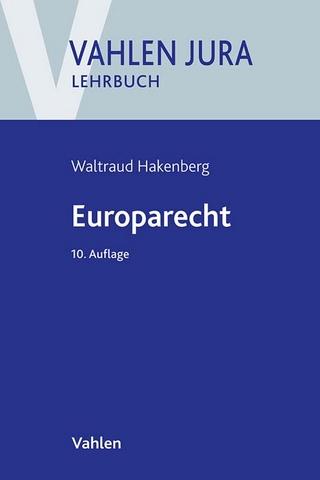
The Routledge International Handbook of Perpetrator Studies
Routledge (Verlag)
978-1-138-10324-5 (ISBN)
The Routledge International Handbook of Perpetrator Studies traces the growth of an important interdisciplinary field, its foundations, key debates and core concerns, as well as highlighting current and emerging issues and approaches and pointing to new directions for enquiry. With a focus on the perpetrators of mass killings, political violence and genocide, the handbook is concerned with a range of issues relating to the figure of the perpetrator, from questions of definition, typology, and conceptual analysis, to the study of motivations and group dynamics to questions of guilt and responsibility, as well as representation and memory politics. Offering an overview of the field, its essential concepts and approaches, this foundational volume presents contemporary perspectives on longstanding debates and recent contributions to the field that significantly expand the theoretical, temporal, political, and geographical discussion of perpetrators and their representation through literature, film, and art. It points to emerging areas and future trends in the field, thus providing scholars with ideas or encouragement for future research activity. As such, It will appeal to scholars across a range of disciplines, including sociology, anthropology, criminology, philosophy, memory studies, psychology, political science, literary studies, film studies, law, cultural studies and visual art.
Susanne C. Knittel is Assistant Professor of Comparative Literature at Utrecht University, the Netherlands. Her research focuses on questions of memory, commemoration, and cultural amnesia across cultures and media. She is the author of The Historical Uncanny: Disability, Ethnicity, and the Politics of Holocaust Memory and editor in chief of The Journal of Perpetrator Research. Zachary J. Goldberg is Research Fellow in moral philosophy at Ludwig-Maximilians-Universität München, Germany. His most recent publications focus on the metaethics and normativity of the concept of evil, and theories of individual and collective moral responsibility. He is currently Principal Investigator of the project "Components of Evil: An Analysis of Secular Moral Evil and its Normative and Societal Implications" funded by the Deutsche Forschungsgemeinschaft.
Introduction Part 1: Core Concepts and Key Debates 1.1 Definitions and Terminology 1. From Perpetrators to Perpetration: Definitions, Typologies, and Processes 1.2 Group Dynamics and Moral Psychology 2. The Making and Un-Making of Perpetrators: Patterns of Involvement in Nazi Persecution 3. Ordinary Organizations: A Systems Theory Approach to Perpetrator Studies 4. Stanley Milgram’s Obedience Experiments 5. The Authoritarian Personality: Then and Now 6. What’s Moral Character Got to Do with It? Perpetrators and the Nature of Moral Evil 7. The Making of a Torturer 8. Linking Perpetrator Characteristics to Jihadist Modus Operandi: An Explorative Study 1.3 Perpetrators and the Law 9. Nazi Perpetrators and the Law: Postwar Trials, Courtroom Testimony, and Debates About the Motives of Nazi War Criminals 10. When Perpetrators Become Defendants, and then Convicts 11. Unsettling Accounts: Perpetrators’ Confessions in the Aftermath of State Violence and Armed Conflict 12. The Coercive Effects of International Justice: How Perpetrators Respond to Threats of Prosecution Part 2: Intersections 2.1 Perpetrators – New Theoretical Approaches 13. Gendering the Perpetrator – Gendering Perpetrator Studies 14. Posthumanism and Perpetrators 15. Notes on the Subaltern: Or, How Postcolonial Critique Meets the Perpetrator 16. Perpetrators, Animals, and Animality 17. Understanding Perpetrators’ Use of Music 18. Information Technologies and Constructions of Perpetrator Identities 19. Climate Change Perpetrators: Ecocriticism, Implicated Subjects, and Anthropocene Fiction 2.2 Aftermaths: Responsibility, Trauma, and Memory 20. Moral Responsibility and Evil 21. Restorative Justice and the Challenge of Perpetrator Accountability 22. The Contours and Controversies of Perpetrator Trauma 23. The Intergenerational Effects of Mass Trauma in Sculpting New Perpetrators 24. One Perpetrator at a Time: The Contribution of Public Health Science to Genocide Prevention 2.3 Perpetrators and Representation 25. Perpetrators and Perpetration in Literature 26. Whose Evil is This? Perpetrators in the Theater 27. Representing Infamous Others: Perpetrator Imagery in Visual Art 28. Cultural Codes: Holocaust Resonances in Representations of Genocide Perpetrators 29. Playing Perpetrators: Interrogating Evil in Videogames about Violent Conflicts 2.4 Teaching about Perpetrators 30. Playing Devil’s Advocate: Classroom Encounters with Holocaust Perpetrators 31. Teaching the Perpetrator’s Perspective in Holocaust Literature 32. Teaching For/About Empathy in Peace Education 33. Beyond Thinking Like a Lawyer: Providing a Space for Perpetrator Studies within the Legal Classroom 34. The Ethics of Discomfort: Critical Perpetrator Studies and/as Education after Auschwitz
| Erscheinungsdatum | 20.11.2019 |
|---|---|
| Reihe/Serie | Routledge International Handbooks |
| Zusatzinfo | 6 Tables, black and white; 1 Halftones, black and white; 1 Illustrations, black and white |
| Verlagsort | London |
| Sprache | englisch |
| Maße | 174 x 246 mm |
| Gewicht | 890 g |
| Themenwelt | Recht / Steuern ► EU / Internationales Recht |
| Sozialwissenschaften ► Politik / Verwaltung | |
| Sozialwissenschaften ► Soziologie | |
| ISBN-10 | 1-138-10324-1 / 1138103241 |
| ISBN-13 | 978-1-138-10324-5 / 9781138103245 |
| Zustand | Neuware |
| Informationen gemäß Produktsicherheitsverordnung (GPSR) | |
| Haben Sie eine Frage zum Produkt? |
aus dem Bereich


